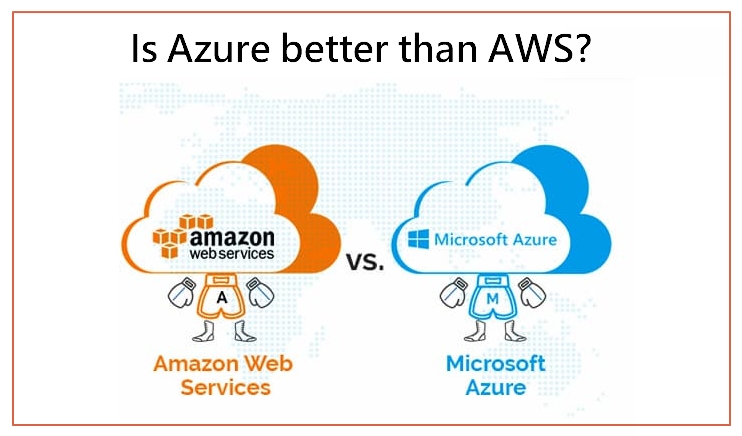Cloud computing has become a key to enhancing businesses. The reason being, it results in increasing the revenue and help achieve business goals. Therefore, companies prefer to use cloud services more than building their own infrastructure. The main confusion that appears here is to choose the right cloud platform that can help you easily get started with cloud computing. The two most popular brands offering public cloud services include Amazon Web Services (AWS) and Microsoft Azure. Now, the question arises which one to choose?
In this article, we have highlighted a comparative analysis of Azure and AWS considering all possible factors, that will help you make the correct decision. But, first, we will have an overview of both AWS and Azure Services.
Understanding Basics: Azure and AWS
For those who are new to the world of cloud computing, you will want to choose a cloud platform that can be beneficial for you to easily get started with cloud computing. Not to mention, this will be an important task to become familiar with leading cloud service providers. in the same vein, both AWS and Azure are solid performers with similarity in almost 99% of the use cases. So, let’s begin and get all the relevant information regarding the same.
What is Azure?
Azure entered the Cloud Computing industry in 2010 and has made remarkable advancements over the years. Azure is an open-source and flexible cloud platform that helps in performing operations including development, service hosting, service management, and data storage. Moreover, it offers a various set of features and capabilities better than its competitors.
And, the Azure cloud computing tool hosts web applications over the internet using Microsoft data centers.
Advantages of Azure
Major advantages of using Azure cloud services are;
- Firstly, in this, the developers and users can create, maintain and deploy the applications.
- Secondly, it is a scalable cloud computing platform that offers open access to multiple languages, frameworks, and tools.
- Azure supports Microsoft legacy apps and takes care of every need of the enterprise.
- There is one click movement in many cases with the conversion of on-premises licenses to the cloud.
- Moreover, Azure supports both Linux and Windows environments. Also, it offers inbuilt tools like Azure stack to help the organization deliver Azure service from its own data center.
What is AWS?
On the other hand, AWS was launched in 2006 and comes under the top cloud service providers. Amazon Web Services is widely used for securing the cloud services platform, offering computing power, content delivery, database storage, and other functionality to help businesses and organizations to scale and grow.
Advantages of AWS
The advantages of AWS cloud services are,
- Firstly, compute cloud in AWS allows you to increase or decrease the storage according to the need of your organization.
- Subsequently, AWS enables you to select an operating system, programming language, database according to the requirement.
- It provides deep service offerings and a robust partner ecosystem.
- AWS has gained the trust of many high-profile customers by providing high Transfer Stability.
- In this, there is minimal loss of information during server and storage transfer. Also, it offers more data centers for availability and low latency.
- Lastly, it has better supports DevOps including BI and analytics.
Next, we will talk about the in-depth comparison of AWS and Azure.
Comparison of AWS and Azure using Key Pointers
In this section, we will compare AWS and Azure using different factors.
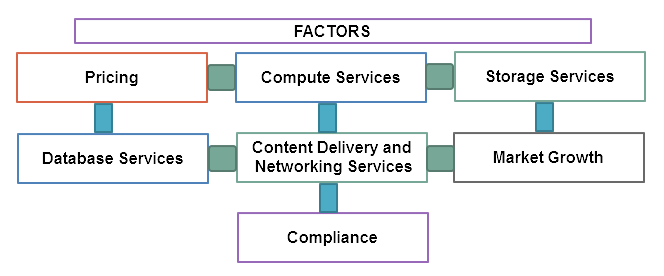
First, let’s take a look at the pricing factor.
Pricing
- Pricing is an essential factor that is examined by most of the organizations planning to move to the cloud. And, with increasing competition between these cloud service providers, there has been a battle on prices for quite some time now.
- However, both AWS and Azure offer free tiers with restricted usage limits that let users try and use their services before they can buy. And talking about the pay structure then, AWS charges the user on an hourly basis and Azure charges you on a per-minute basis.
- But, when it comes to short term subscription plans then, Azure offers you a lot more flexibility. Moreover, in certain services, Azure seems to be costlier than AWS when the architecture starts scaling up.
Compute Services
- Compute services or Computation are the core services of Cloud Computing. As there is a requirement for faster processes when large amounts of data are generated. And, in addition, computation provides guarantee you can generate cases in minutes and then scale up instantly if needed. Not to mention, both AWS and Azure provide these services.
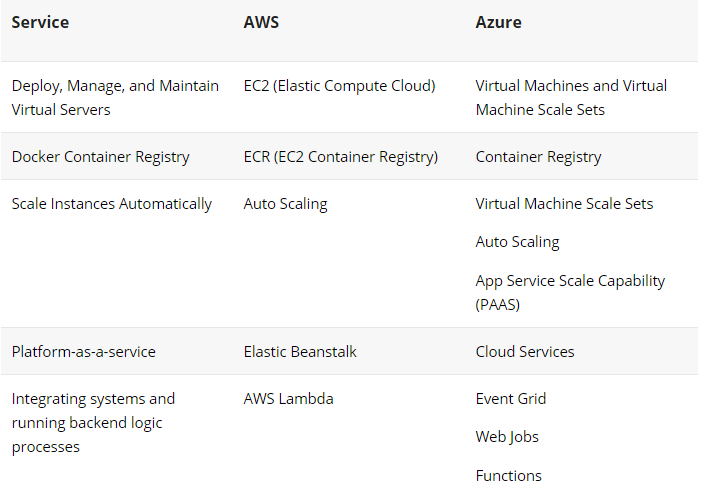
- Talking of services, AWS provides services like EC2, Elastic Beanstalk, AWS Lambda, ECS, etc. Whereas, Azure provides services like Azure Virtual Machine, App Service, Azure Functions and Container service, etc.
After computation, the next we will understand about storing this data.
Storage Services
Both AWS and Azure provide long-running and good storage services. In which, AWS has services like AWS S3, EBS, and Glacier and Azure Storage Services have Blob Storage, Disk Storage, and Standard Archive.
For object Storage,
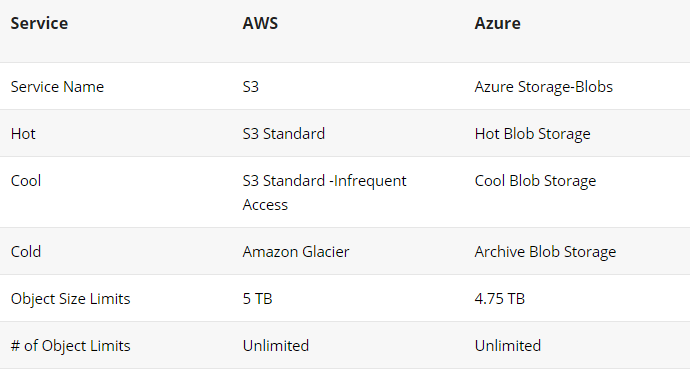
However, the AWS S3 ensures high availability and automatic replication across regions. And, when it comes to temporary storage, AWS starts functioning each time the case starts and stops. Moreover, it also provides block storage that is similar to hard disks and can be attached to any EC2 instance.
For Block Storage,

- On the other hand, Azure uses temporary storage and page blobs for VM volume. And, Azure has a Block Storage option equivalent to S3 in AWS. In addition, Azure has two types, cold and hot storage.
Next, we will take a look at the Database Services.
Database Services
- Data that is generated has different formats and the databases that hold this data need to be evolved. However, AWS and Azure provide different database services to handle both structured and unstructured data. For which AWS has an Amazon RDS database service In which, Amazon RDS supports different database engines like MariaDB, Amazon Aurora, MySQL, Microsoft SQL, PostgreSQL, and Oracle. And, Azure has Azure SQL Server Database that is based on SQL.
- Talking about the interface, Azure has a smoother interface whereas, AWS provides better services with more cases. And, it can be seen that both of them have their features to show.
- To reach these services, both have services for analytics and Big Data. Where AWS has EMR and Azure has HD Insights.
- In addition, Azure also provides Cortana Intelligence Suite that comes with Hadoop, Spark, Storm, and HBase.
In the same vein, let’s continue and learn about Networking,
Content Delivery and Networking Services
- Most cloud service providers have multiple networks and partners that interconnect data centers worldwide through various products. However, AWS provides Amazon Virtual Private Cloud (VPC) that enables the creation of isolated networks under the Cloud. And, this enables users to route tables, private IP address ranges, create subnets, and network gateways.
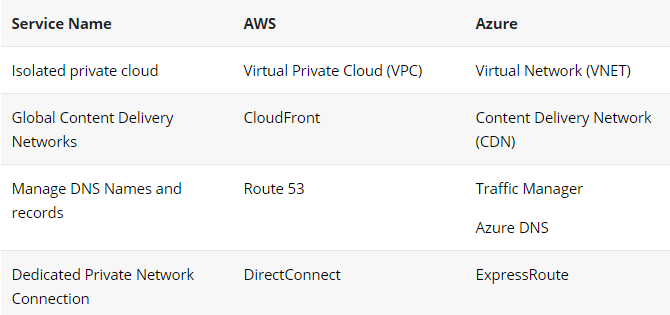
- On the other hand, Microsoft Azure has Azure Virtual Network as similar to VPC that allows you to perform the same operations as VPC. Moreover, both of them have solutions to extend the on-premise data center into the cloud and firewall options.
Market Growth
- Talking about the growth rate in the past few years, both Azure and AWS have resulted in increasing their revenues. And, the money available is used for the development of new cloud products and services that provides benefits to the end-user businesses.
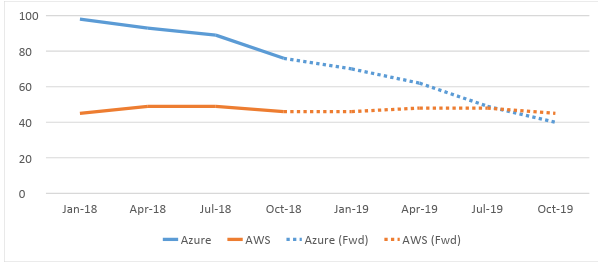
- The above graph demonstrates the growth of both Azure as well as AWS. In this, both companies released three sets of quarterly reports – in April, July, and October. And, these reports explain that AWS’ revenue growth has remained stable, whereas Azure’s revenue growth has slightly decelerated. But, Azure still leads the way in growth comparison. Not to mention, this graph changes every year. Therefore, businesses don’t have to select one cloud service provider. Because they can take benefits from both by having the best products and services from each, and manage them accordingly.
The last one is Compliance.
Compliance
- AWS has linked up with the government agencies by ensuring better government cloud offerings. And, they also provide great security measures for proper access to individual users when it comes to accessing the cloud.
- Whereas, Microsoft provides more than 50 compliant offerings. And, some important ones include ITAR, DISA, HIPAA, CJIS, and FIPS. Not to mention, it provides good competition to AWS when it comes to security.
AWS and Azure: Top Certifications
They both offer different levels of certifications that can help you enhance your career and inturns secures your future. So, let’s first talk about the certifications that AWS offers.
AWS is the top public cloud service provider that offers AWS certifications that can be categorized into – Foundational, Associate, Professional and Specialities.
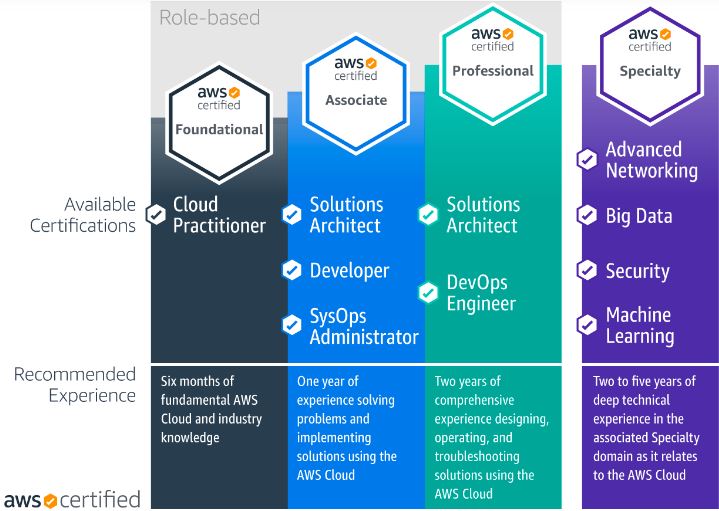
On the other hand, Azure also has different levels of certifications that you can opt according to the skills and experience you have, The certifications are,

In the next section, we will talk about selecting the right cloud service.
Choosing the right Cloud Service
This is a very important decision for an organization to choose accurate cloud service providers. As all the organizations require the best cloud strategy to apply. Let’s learn more about this.
- Firstly, both Azure and AWS provide hybrid solutions for cloud but Azure has a better hybrid solution.
- Secondly, AWS offers direct connection whereas Azure offers express routes.
- Moreover, AWS has Virtual Private Cloud and Azure has a virtual network cloud.
- However, Azure results in helping many enterprises to accelerate their business growth but AWS has still maintained that position of being the largest cloud computing service provider.
- Azure provides security by giving permissions on the whole account whereas AWS security is provided using the roles that are defined with the permission control feature.
- Most importantly, both AWS and Azure are introducing new products, new integrations, and new pricing structures using advanced cloud technology. So, the final selection will depend on the need of the organization.
Final Judgement
In this article, you have understood the basics as well as the comparison of AWS and Azure. There is no way to find out which cloud service providers is good. Because at last, the organizations have to choose the cloud service providers that enable a multi-cloud strategy. Moreover, some companies that need high availability and resilience can consider multiple-data center hosting that requires both of them. Lastly, deciding the right public cloud service provider needs in-depth research on what the company really requires and also what the service provider offering. So, between these two the clear winner is users as each of these providers has to make customers show interest with expanded offerings at economical cost.
Learn and enhance your AWS and Azure skills. Prepare to become a Certified Azure Professional and Certified AWS Professional Now!

